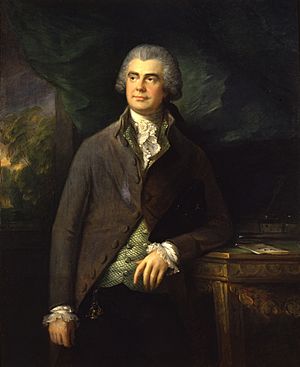Richard Warren (physician) facts for kids

Richard Warren (1731–1797) was an important English doctor. He was known for treating many famous and wealthy people in society.
Contents
Early Life and School
Richard Warren was born on December 4, 1731, in a place called Cavendish, Suffolk. His father was also named Richard Warren, and he was a church leader. Richard had a younger brother named John, who later became a bishop. Richard went to school at Bury St. Edmunds grammar school.
His College Days
In 1748, after his father passed away, Richard Warren went to Jesus College, Cambridge. He was a very smart student. In 1752, he earned his first degree, graduating as the fourth best student in his class. He continued his studies and earned his M.A. degree in 1755. Finally, on July 3, 1762, he became a Doctor of Medicine (M.D.).
Interestingly, Richard first thought about becoming a lawyer. But a lucky chance led him to become a doctor instead. While at Cambridge, he tutored the son of Peter Shaw. Dr. Shaw was a well-known doctor who treated King George II and King George III. In 1763, Richard Warren took over Dr. Shaw's medical practice. This happened because Richard had married Dr. Shaw's daughter, Elizabeth, in 1759.
A Doctor for Hospitals and Royalty
Richard Warren started his medical career working in hospitals. On August 5, 1756, he became a doctor at the Middlesex Hospital. Later, on January 21, 1760, he also became a doctor at St. George's Hospital. He eventually left both of these hospital jobs to focus on other work.
In 1762, he joined the Royal College of Physicians. This was a very important group for doctors. A famous court doctor, Sir Edward Wilmot, suggested that Richard help him treat Princess Amelia. When Sir Edward retired, Richard continued to be the princess's doctor. Because of her influence, he was then chosen to be the King's own doctor.
Richard Warren became a Fellow of the Royal College of Physicians in 1763. He gave important lectures there in 1764 and 1768. He also became a Fellow of the Royal Society in 1764, which is a group for top scientists.
In 1787, Richard was appointed as the doctor for the Prince of Wales. The Prince later asked him to help treat the King when he was unwell in 1788–89. Richard Warren became incredibly successful and earned a lot of money, more than most doctors at that time.
He passed away on June 22, 1797, at his home in Dover Street. He was buried in Kensington parish church.
His Writings
Richard Warren wrote some medical papers. One was about a lung condition called bronchial polypus. Another was an essay about a type of lead poisoning called Colica Pictonum. These were published in the Transactions of the College of Physicians. He also published his Latin speech from 1769.
His Family
Richard Warren and his wife, Elizabeth Shaw, had a large family. They had eight sons and two daughters. Two of their sons also became notable: Frederick Warren became a rear-admiral in the navy, and Pelham Warren followed in his father's footsteps and became a physician. When Richard Warren died, he left his family a very large amount of money, over £150,000.
Images for kids
 | Valerie Thomas |
 | Frederick McKinley Jones |
 | George Edward Alcorn Jr. |
 | Thomas Mensah |


